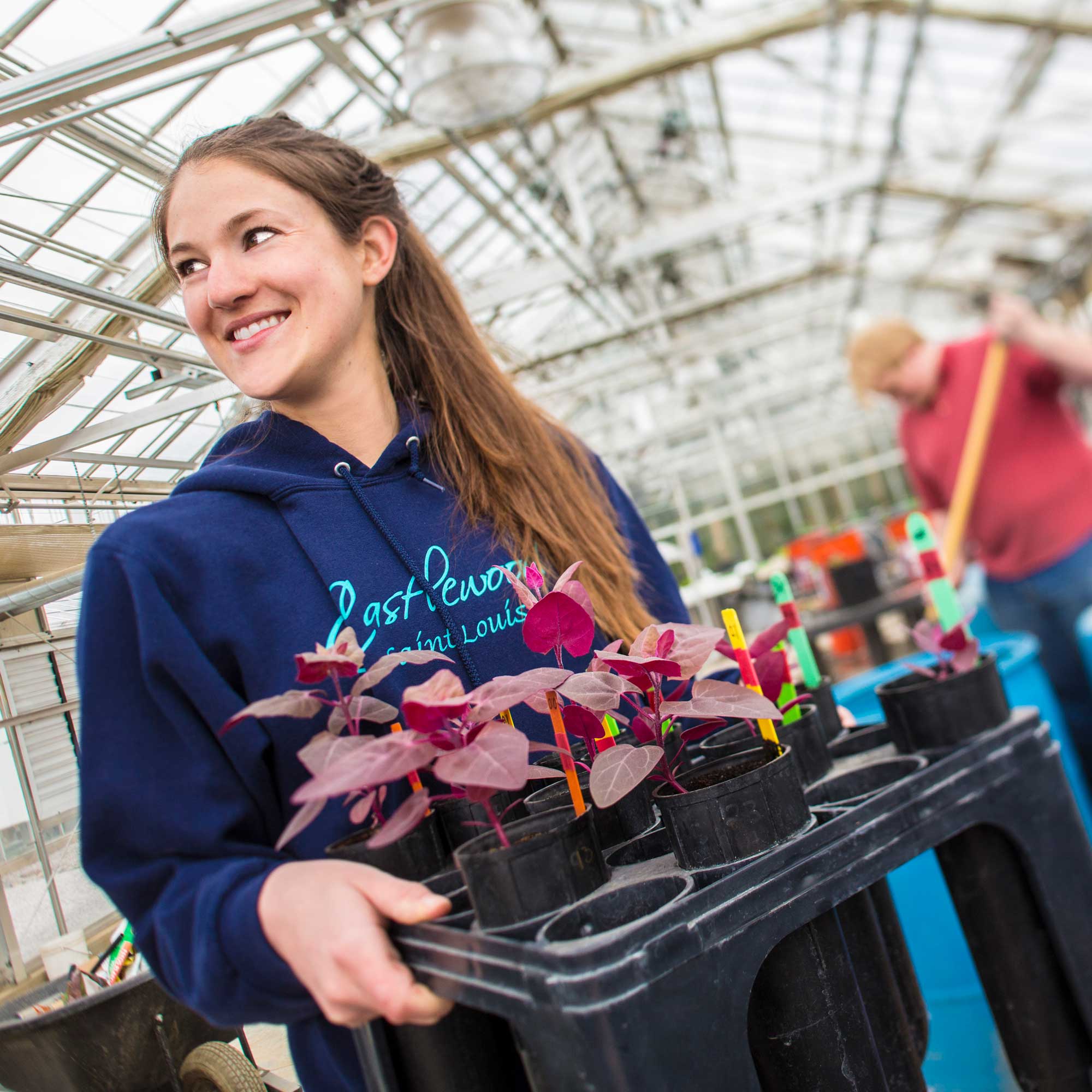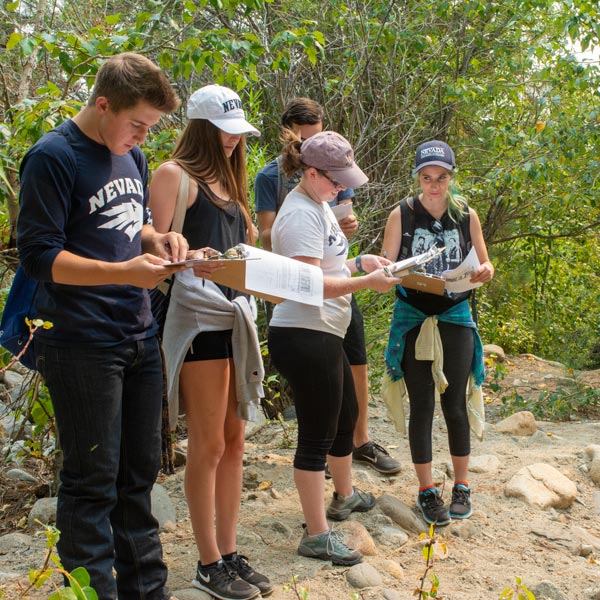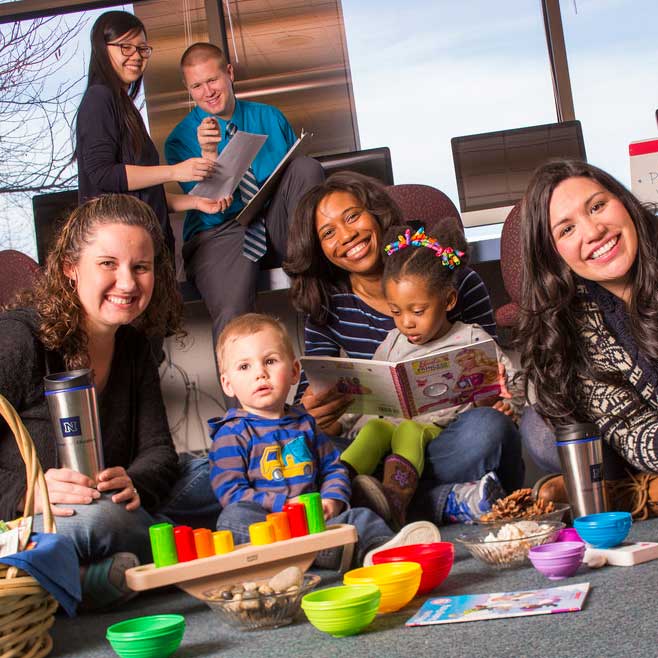In this edition
- Researchers shed light on river resiliency to flooding
- Extension offers training for professionals working with domestic violence
- Extension offers Nevada agriculture conferences to celebrate National Ag Month
- New director of development to lead fundraising efforts for the College
- Photo story | Two touchdowns for health
About our College
A founding college of the University, we have a long tradition of excellence in teaching, research and engagement programs that benefit the health and economic vitality of Nevada. We offer programs in:
- agriculture, horticulture, rangeland and veterinary sciences
- biochemistry and molecular biology
- children, youth and families
- community and economic development
- health and nutrition
- natural resources and environmental science
Researchers shed light on river resiliency to flooding
College researchers use oxygen sensor data to estimate how long it takes river ecosystems to recover after floods
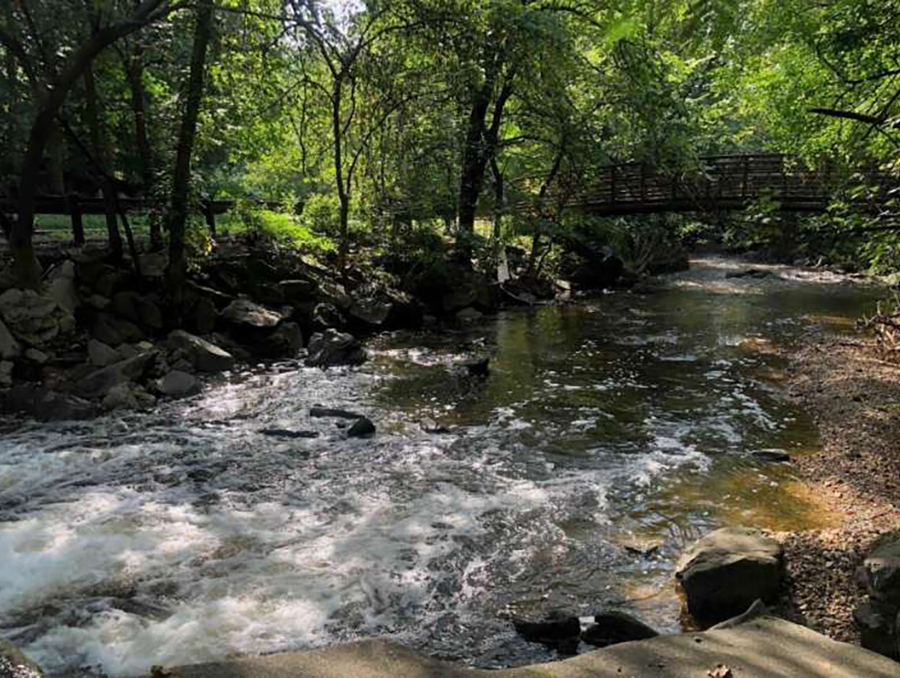
The researchers estimated the recovery time of river productivity in Sligo Creek in Maryland, about 30 miles southwest of Baltimore, to be about 12 days, which is greater than the median recovery time of 7.3 days across all sites in the study and more typical of narrower rivers. Photo by Heili Lowman.
Researchers in the College have completed one of the most extensive river resilience studies. They developed a novel modeling approach that used data from oxygen sensors placed in rivers to estimate daily growth in aquatic plants and algae. The researchers then modeled the algal and plant biomass in 143 rivers across the U.S. to quantify what magnitude of flooding disturbs the biomass and how long the rivers take to recover.
The research is unique because it estimates changes in biomass more frequently than ever before without needing to directly sample rivers.
“Previously, you would have to go to a river and scrub rocks,” Assistant Professor Joanna Blaszczak, who led the research, said. “This is very time consuming, so the data have been extremely limited relative to our sensor networks.”
Leading the research with Blaszczak was Postdoctoral Scholar Heili Lowman. Assistant Professor Robert Shriver provided biomass growth modeling. The three are part of the College’s Department of Natural Resources & Environmental Science and Experiment Station.
They found that wider rivers without dams are more resilient, and rivers that had more frequent floods tended to recover more quickly.
Improving river management
“With the sensors we can get a much bigger, clearer picture. We can model the size of flood needed to disturb the biomass in a river, as well as the rate at which a river recovers from flood, which can help us manage rivers more effectively.” - Assistant Professor Joanna Blaszczak
Extension offers training for professionals working with domestic violence
‘Hope for Family Resilience’ provides in-depth training on domestic violence advocacy and support
Tenyson Fowler | Molly Malloy
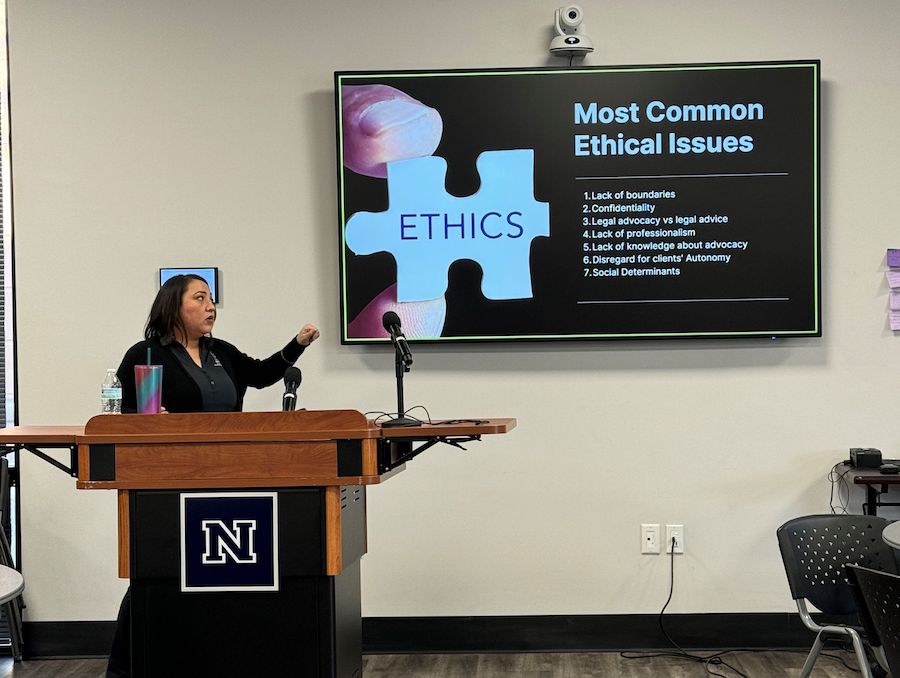
Elizabeth Ornelas, Extension Hope for Family Resilience coordinator, teaches the 40-hour Hope Advocacy Training to the staff and volunteers at SafeNest in Las Vegas in January 2024. Photo by Clair Thomas.
A new training aimed at enhancing advocacy and support for victim-survivors of domestic or intimate partners violence is now available to anyone who advocates for, works with, or provides resources and support to victim-survivors, such as law enforcement, medical professionals, judges, lawyers, resource centers, therapists, social workers, teachers and victim advocates.
Developed by Extension’s Hope for Family Resilience Program, the new 40-Hour Hope Advocacy Training provides updated, evidence-based best practices and information to help better serve and assist victim-survivors. Trainings this spring will be held March 4-7 in Reno and April 8-11 in North Las Vegas.
Extension partnered with the University’s College of Education & Human Development to develop and provide the training, which is suitable for both new and experienced advocates.
“Every aspect of the training is backed by rigorous research, ensuring that advocates are equipped with the necessary skills and knowledge for their pivotal roles,” said Pamela B. Payne, associate professor with both Extension and the College of Education & Human Development.
Empowering families
“Empowering families and victims of domestic violence by increasing awareness and offering trainings and support is the goal of our program.” - Associate Professor Pamela Payne
Extension offers Nevada agriculture conferences to celebrate National Ag Month
Conferences gather agriculture producers, beekeepers and others to share knowledge and expertise
Claudene Wharton | Tenyson Fowler
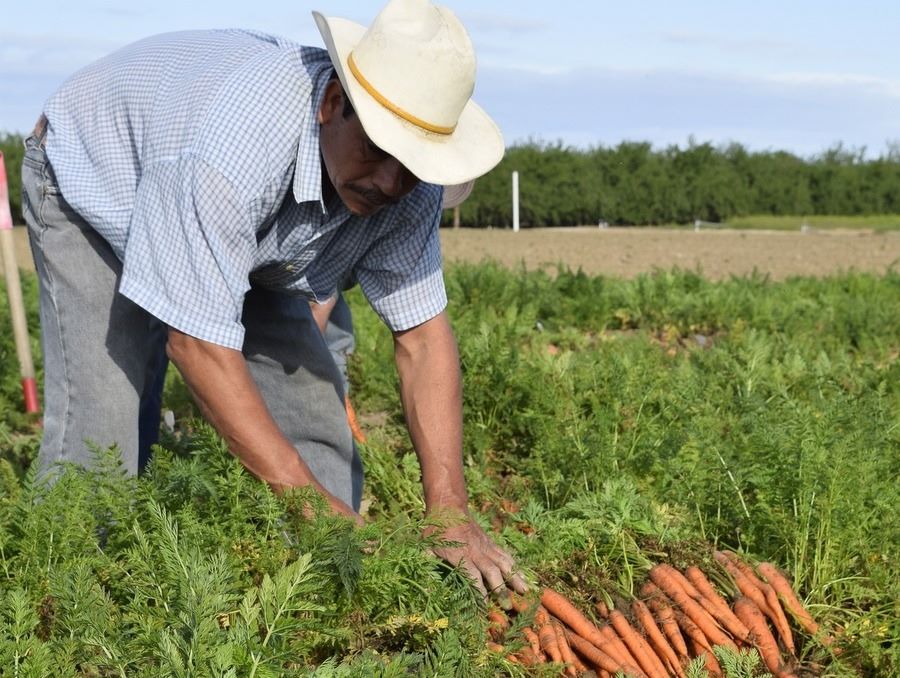
Extension celebrates National Agriculture Month this March by hosting several conferences for Nevada agriculture producers and related businesses.
In celebration of National Agriculture Month in March and to help provide education and support for Nevada’s agriculture producers, associated businesses and others, Extension is partnering with other organizations to host three agriculture conferences throughout the state.
In addition to agriculture producers, the conferences also offer learning opportunities for chefs and restaurant owners, recreational gardeners, youth gardeners, and others, depending on the conference.
Urban Agriculture Conference
North Las Vegas
March 6-8
- Places an emphasis on supporting both local producers and associated businesses.
- Features a farm-to-fork dinner, supporting local producers, chefs and restaurants.
Small Agriculture Conference
Fallon
March 13-15
- Provides an opportunity for those with smaller operations to meet and share information about available resources.
- Features a grow-local dinner.
Bee and Garden Conference
Minden
March 22-24
- Focuses on beekeeping, pollinators, and landscaping for homeowners and small acreages.
- Features hands-on classes, as well as a Jr. Master Gardener session for youth.
Supporting our local food systems
“Extension is very excited to be able to offer these educational opportunities. We realize that our local food systems are extremely important to our communities and want to facilitate long-term sustainability.” - Extension Educator Staci Emm
New director of development to lead fundraising efforts for the College
Robin Schimandle to elevate academic and research excellence through strategic donor engagement

Robin Schimandle joins the College as the new director of development.
The College has hired Robin Schimandle as the new director of development to support the College’s various programs that promote student learning, scientific research, and community engagement and programs throughout the state.
Schimandle brings extensive experience and a proven track record in philanthropy, donor stewardship and engagement, having successfully led fundraising campaigns and donor engagement initiatives in previous roles. In her new position, she will collaborate with alumni, businesses, foundations and other key stakeholders to cultivate partnerships and secure financial resources for the College. These funds will support various initiatives, including student scholarships, internships, academic research and community engagement, as part of a diverse range of activities across the College’s units, including its four academic departments, Extension, the Experiment Station and Extended Studies.
"We are confident that Robin’s leadership will propel our fundraising efforts to new heights," said Bill Payne, dean of the College. "Her proven track record and strategic vision will be invaluable assets as we work to support the vital programs and initiatives within the College."
In addition to her experience in philanthropy, Schimandle also brings extensive expertise in marketing, advertising, communications and event planning.
Furthering impactful research and programs
"I'm pleased to be part of a team dedicated to raising financial resources to sustain the large volume of research and programs at the College that directly impact the lives of Nevadans. The tangible benefits of the work at the College are evident throughout the state, and it is incredibly exciting to be able to further this work through philanthropy." - Development Director Robin Schimandle
Photo story | Two touchdowns for health
Extension programs take part in two different events with the NFL
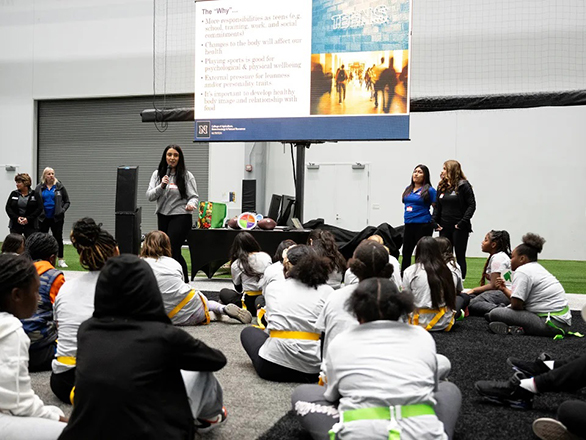
In January, Extension partnered with University of Nevada, Las Vegas and the Las Vegas Raiders to provide nutrition education for youth in the Raiders/UNLV Sports and Health Program (RUSH). Photo by Jeffery Bennett, Las Vegas Raiders.
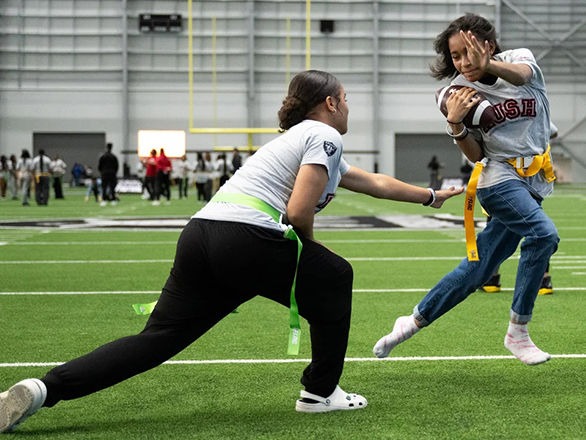
The program provides opportunities for middle school-aged youth to learn the skills and knowledge to play sports, choose healthy foods to fuel their sports, and seek mental health resources. Photo by Jeffery Bennett, Las Vegas Raiders.
Empowering a healthy future
“4-H programming empowers youth to be healthy – body and mind – with the skills to make healthy decisions and lead healthy lifestyles. This not only improves well-being; it enables youth to tackle life’s challenges and become leaders in their lives, careers and communities.” - 4-H National Council
Innovating for Nevada
Our programs work together to make an impact
Our teaching, research and engagement programs are intertwined and complement one another. Faculty who teach on campus also conduct research as part of our Experiment Station, allowing students to learn about and participate in research. Extension faculty engaging with communities identify research needs, as well as join Experiment Station faculty to conduct research. Faculty on campus help to develop Extension programs in communities.
